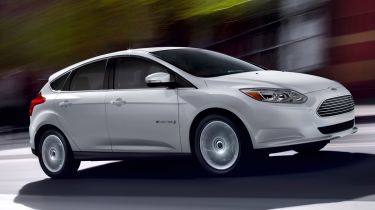Ford Focus BEV
Our verdict on the all-electric version of the big-selling Ford Focus

As with all electric cars, the Focus BEV is hampered by its limited range, long recharging time and high price. That doesn’t take away from the fact that it drives well and feels comfortable. It’s just not a true alternative to a regular petrol or diesel car yet. The plug-in hybrid tech coming for the C-MAX will be a better bet.
This electric Ford Focus could be the most important plug-in car yet. The Battery Electric Vehicle (BEV) goes on sale in September and will cost at least £25,000, including the £5,000 Government discount.
The powertrain consists of a lithium-ion battery pack and a 130bhp electric motor, which gives a range of about 100 miles and a 0-60mph time in the region of 9.5 seconds.
Top speed is close to 90mph and a recharge using a standard household plug should take eight hours, although Ford has plans to market its own high-current recharging packs.
The car weighs about 200kg more than a petrol-engined Focus, but engineers have done a good job of minimising the impact. Select Drive on the automatic-style selector and the car creeps gently forward in complete silence.
Acceleration from rest is brisk thanks to the 335Nm of torque, but tails off artificially at about 50mph to preserve the battery charge.
The ride is comfortable and the handling is almost as nimble as in a standard Focus, complete with well weighted and responsive steering.
Heat produced when you brake is stored as electrical energy in the batteries, while the brakes feel much smoother than those in a Nissan Leaf.
However, living with the Focus BEV on an everyday basis will prove to be tougher than with a standard Focus. The twin battery packs that provide the power are mounted under the rear seats and in the boot, which reduces the luggage space to nearly half that of the regular hatch’s.
In the way it drives and looks, the Focus is one of the best electric cars yet – but it’s still easy to find compromises.







